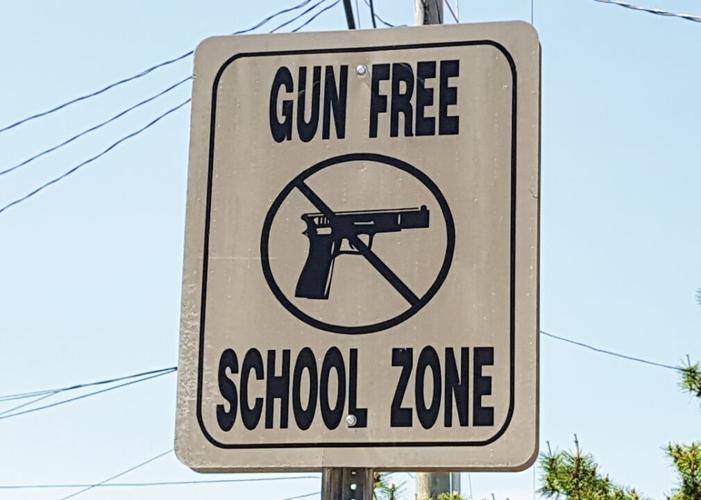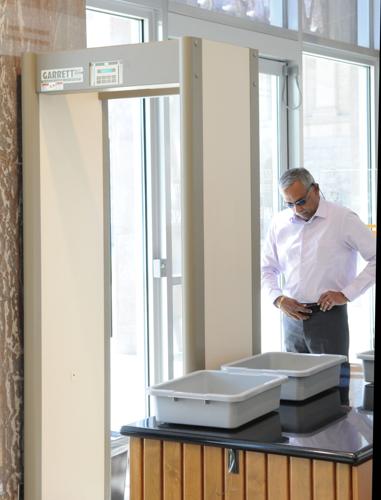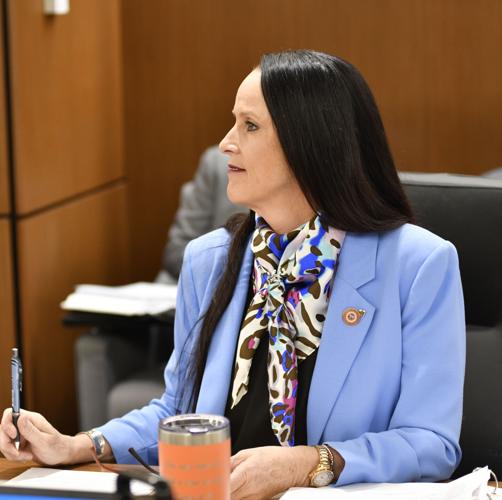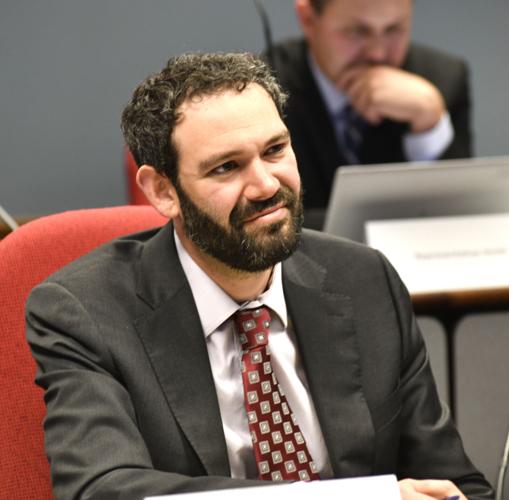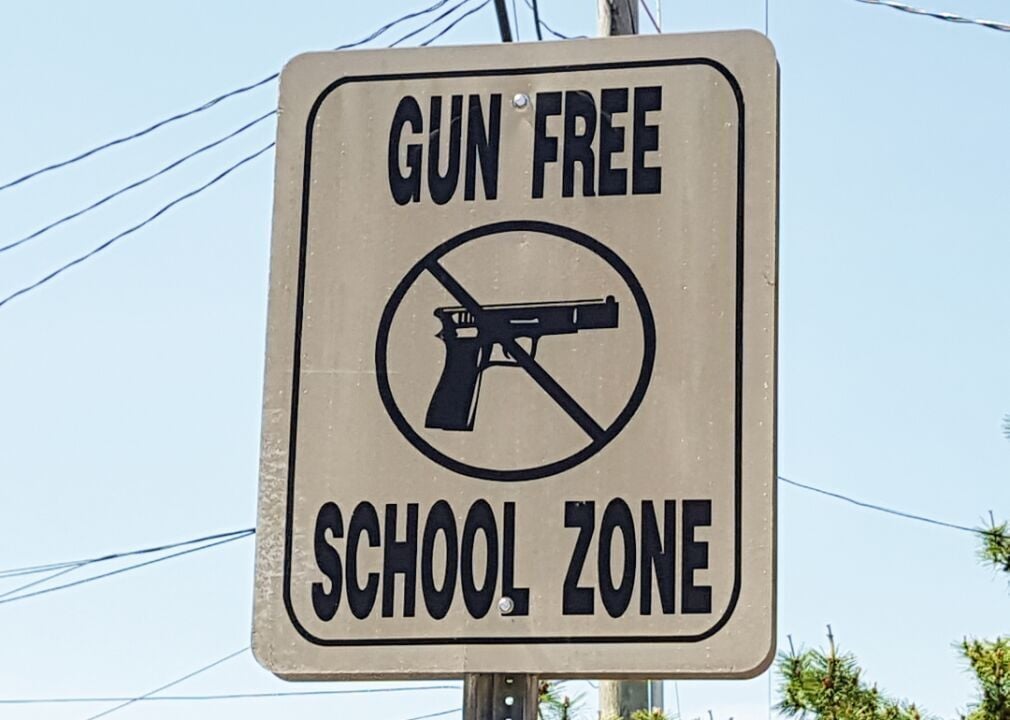PHOENIX — House lawmakers voted Wednesday to let certain parents bring loaded guns onto school campuses, despite the fact rules and a metal detector keep armed constituents out of their own building.
Existing laws now prohibit loaded firearms on public school, college and university campuses. Senate Bill 1331 would create an exemption saying that prohibition doesn’t apply to parents or guardians of students who attend the school, provided they have a state-issued permit to carry a concealed weapon.
The measure, already approved by the Senate, was advanced on a party-line vote by the Republican-led House Judiciary Committee — where the chairman said he was carrying a concealed gun himself. It now goes to the full House.
Sen. Janae Shamp, R-Surprise, said the existing restriction for schools makes no sense. “How many criminals pay attention to a law?’’ she asked.

Sen. Janae Shamp, R-Surprise, said her bill would extend the right to carry guns to campuses, from elementary schools up through universities, to "people who have taken the training and who are looking to protect.''
Shamp said her bill would extend the right to carry guns to campuses, from elementary schools up through universities, only to “people who have taken the training and who are looking to protect.’’
That didn’t convince Anne Thompson of the group Moms Demand Action, which lobbies for stronger gun laws.
“Firearms are dangerous and they can be deadly weapons,’’ she told lawmakers. “Allowing guns in schools is an extreme measure that will endanger children, young people, teachers, staff and visitors.’’
‘Does make us look slightly hypocritical’
Thompson pointed out there are places where guns are not allowed, whether because of federal or state laws. These include polling places on Election Day, secure areas of airports, and detention facilities.
And to that list, add the Arizona House of Representatives — where visitors are required to go through a metal detector and must either leave their weapons in their vehicles or check them with security.
“Why would we not give our children the same security?’’ Thompson asked.
Rep. Alexander Kolodin, R-Scottsdale, acknowledged the point.

Visitors to the Arizona House of Representatives have to pass through metal detectors and must either leave their weapons elsewhere or surrender them temporarily to security.
“I agree, it does make us look slightly hypocritical when we’re running bills like this,’’ he said.
In fact, Kolodin said he would support removing the metal detector, “just as the Senate has so that citizens could exercise the constitutional right to keep and bear arms in their House.’’
That’s not exactly true: While there are no metal detectors at the Arizona Senate, visitors are not allowed to bring in their weapons there, either.
But Rep. Quang Nguyen, R-Prescott Valley, who chairs the Judiciary Committee, said that doesn’t mean there are no guns at the Capitol, even beyond those of security officers.
“I’ve been a CCW holder for probably close to the last 20 years,’’ Nguyen told colleagues. “And I’m practicing my Second Amendment even today. So I think this whole entire room can be considered to be safe around me.’’
A similar exception to laws banning weapons in public buildings exists for lawmakers in the Senate.
Debate: Deterrent, or more chaos?
Michael Infanzon, lobbyist for the Arizona Citizens Defense League, told lawmakers there’s no reason to believe that permitting carry concealed weapon (CCW) permit holders to bring guns onto campuses would lead to more students being shot and killed at school. Instead, Infanzon cited instances where he said armed individuals helped stop mass shootings.
“The presence of firearms in the hands of responsible and trained individuals can act as a deterrent to potential shooters,’’ he said. Infanzon said a study by the Journal of Criminal Justice showed states that license people to carry concealed weapons saw a reduction in violent crime rates.
But Rep. Lupe Contreras, D-Avondale, said simply having a CCW permit, with its four-hour training requirement, hardly prepares people to deal with emergency situations.
He noted testimony on other gun bills by police officers who have talked about the issues they face when being called to an active shooter situation. Contreras said these are adrenaline-filled situations where officers are trying to get people out while focused on finding the shooter.
“I’ve heard it from them, many a time, that the thought of more people other than the perpetrator, that they don’t know about, having a gun within those situations is not safe for them when they go in,’’ he said. “With all the chaos going on, they can’t depict who the perpetrator is and who is not because they’re going in there to try to save our children and save the people that are in whatever environment.’’
No permit required to carry concealed guns
Kolodin, in supporting the legislation, said it doesn’t go far enough. The way he sees it, carrying a concealed weapon is a “constitutional right’’ and there should be no requirement to get a permit to do so.

Rep. Alexander Kolodin, R-Scottsdale, acknowledged having a metal detector at the House while passing the bill to allow some parents to carry guns on school campuses makes lawmakers look slightly hypocritical, but he supports the bill and says it doesn't go far enough.
That actually already is the case.
Arizona adults who have not been convicted of felonies always have been allowed to carry sidearms openly. The right to have a concealed firearm was added in 1994, though that required getting a state-issued permit.
In 2010, however, Gov. Jan Brewer signed legislation allowing any adult to carry a concealed gun.
“I believe this legislation not only protects the Second Amendment rights of Arizona cities, but restores those rights as well,’’ the Republican governor said at the time.
But some people still want — and the state still issues — permits, though the requirements have been eased over the years. CCW permit holders still have special privileges, such as the ability to bring their guns into bars and, if this bill becomes law, onto school campuses if they are parents or guardians.
The state has reciprocity agreements with other states, allowing Arizonans to carry their concealed weapons in states that still require permits.
The Department of Public Safety reports there are currently 452,024 active permits in Arizona.
Lawmakers have come to work armed for years
What applies to lawmakers and guns at the Capitol is a bit fuzzier.
In 2007, Karen Johnson, then a senator from Mesa, told Capitol Media Services that she was bringing her .22 caliber eight-shot revolver into the Senate building despite state laws prohibiting weapons in public buildings.
Tucsonan Tim Bee, who was Senate president at the time, acknowledged that lawmakers had been coming to work armed for a number of years, at least since the 1994 law allowed people to carry concealed weapons. But Bee acknowledged it was sort of a “don’t-ask, don’t-tell’’ policy.
Other lawmakers turned aside questions then about their own gun possession with the exception of Sen. Marsha Arzberger, a Willcox Democrat, who said her weapon of choice was a .38 caliber revolver. “I carry it everywhere I go,’’ she said.
Four years later, Sen. Lori Klein caused a fuss when she pointed her raspberry pink .380 Ruger at Arizona Republic reporter Richard Ruelas in her office while he was interviewing her about carrying a gun into the Senate. Klein said she was simply showing off the weapon and knew it wasn’t loaded.
Both chambers now allow lawmakers to be armed in their buildings.
Some of the strictest gun laws in the country remain on the books in New York after the U.S. Supreme Court rejected a request from a group of firearms dealers to halt parts of new gun laws regulating the commercial sale of firearms.
Howard Fischer is a veteran journalist who has been reporting since 1970 and covering state politics and the Legislature since 1982. Follow him on Twitter at @azcapmedia or email azcapmedia@gmail.com.


